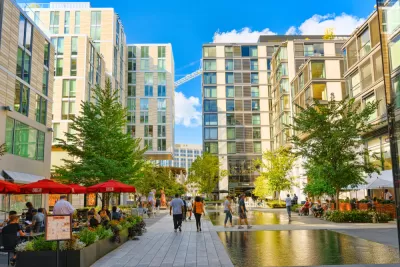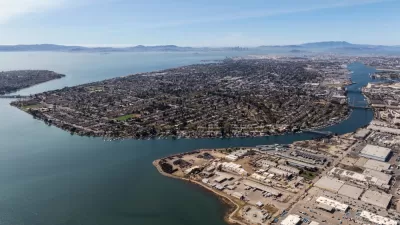The Region United Framework for 2030 outlines a plan for sustainable, equitable development, calling for a 'holistic' approach to regional planning.

Writing in Greater Greater Washington, Ethan Goffman reports on the Metropolitan Washington Council of Governments (COG)’s Region United Framework for 2030, a plan for the future development of the Washington, D.C. region that focuses on equity, transportation, housing, and climate and works to reduce sprawl.
According to Goffman, the updated framework reflects a more concerted focus on equity, the need for which was laid bare by the pandemic’s impact on the most vulnerable populations and essential workers. “While some planners advocated for including these workers before the pandemic, COVID’s disparate impact threw into sharp relief the need for a holistic view of sustainability and inclusion when planning built environments.”
The framework reflects growing support for transit oriented communities (TOC), an update on the traditional transit oriented development (TOD) that centers equity and includes a commitment to ensuring that low-income households aren’t priced out. The framework uses the COG’s Equity Emphasis Areas (EEAs) tool, which identifies “census tracts with high concentrations of low-income people and ‘traditionally disadvantaged racial and ethnic’ groups,” to target investments in transportation, housing, and climate resilience to the areas that need them most. “Beyond housing and transit, TOC requires a comfortable built environment, including safe street crossings, wide sidewalks, and vegetation.”
FULL STORY: How the region’s housing targets can support transit-oriented communities

Planetizen Federal Action Tracker
A weekly monitor of how Trump’s orders and actions are impacting planners and planning in America.

San Francisco's School District Spent $105M To Build Affordable Housing for Teachers — And That's Just the Beginning
SFUSD joins a growing list of school districts using their land holdings to address housing affordability challenges faced by their own employees.

The Tiny, Adorable $7,000 Car Turning Japan Onto EVs
The single seat Mibot charges from a regular plug as quickly as an iPad, and is about half the price of an average EV.

Seattle's Plan for Adopting Driverless Cars
Equity, safety, accessibility and affordability are front of mind as the city prepares for robotaxis and other autonomous vehicles.

As Trump Phases Out FEMA, Is It Time to Flee the Floodplains?
With less federal funding available for disaster relief efforts, the need to relocate at-risk communities is more urgent than ever.

With Protected Lanes, 460% More People Commute by Bike
For those needing more ammo, more data proving what we already knew is here.
Urban Design for Planners 1: Software Tools
This six-course series explores essential urban design concepts using open source software and equips planners with the tools they need to participate fully in the urban design process.
Planning for Universal Design
Learn the tools for implementing Universal Design in planning regulations.
Smith Gee Studio
City of Charlotte
City of Camden Redevelopment Agency
City of Astoria
Transportation Research & Education Center (TREC) at Portland State University
US High Speed Rail Association
City of Camden Redevelopment Agency
Municipality of Princeton (NJ)





























